

 BBC
BBC"A failed free market experiment" – that's how the home secretary will describe the approach that's seen vast numbers of people from around the world come to the UK to pour pints in pubs, to cut hair, to care for the most vulnerable, to pick fruit, or to fix our plumbing.
Yvette Cooper's getting ready to unveil the government's overhaul of the rules that determine who can come to the UK with permission, and for how long.
Her White Paper, which will be called "Restoring Control Over the Immigration System" and be 69 pages long, is a big moment for Labour to try to sort a messy system, under which the numbers of people moving here rose way over most people's imagination.
With Reform hard on Labour's heels, capitalising on public concern about immigration, the success or failure of Cooper is vital to the government.
It will emerge in full on Monday, but we know a lot about what's on the table.
It's expected that work visas will be strictly time-limited for jobs that don't need graduate-level skills.
Foreign students who have studied for degrees here could lose the right to stay in the UK after they finish at university.
Overseas workers will be expected to have a better understanding of English, but reported suggestions of A-level equivalent are wide of the mark.
And companies who repeatedly can't show efforts to recruit UK-based staff, rather than hunt abroad, might lose their right to sponsor foreign workers to come here at all.
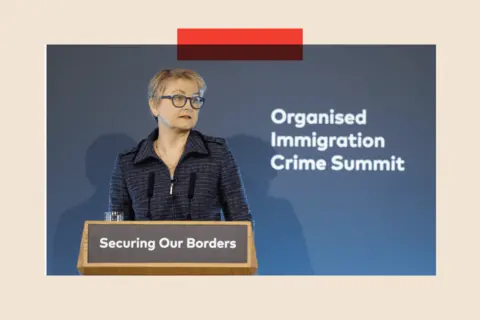 EPA-EFE/REX/Shutterstock
EPA-EFE/REX/ShutterstockThere are also likely to be proposals designed to change how judges apply what's known as Article 8 of the Human Rights Act. It is designed to protect everyone's right to a family life.
But how it's used sometimes by immigration lawyers to stop deportations has long been a concern of politicians – in 2011, I even remember Theresa May claiming an asylum seeker had been allowed to stay in the UK because of their cat.
More than a decade later, recent cases like this one raised at Prime Minister's Questions have led the government to review how the courts have been interpreting everyone's right to a family life. We'll hear more of the details from the home secretary in the studio tomorrow, and likely from the prime minister on Monday.
Some Conservatives and Reform argue the only way of making a material difference is to leave the European Convention on Human Rights altogether, rather than see ministers stick their nose into the courts. Whether the government's proposals here make a difference, we'll have to see.
But the big principle in Cooper's thinking is that the immigration system should be fundamentally linked to the labour market – helping British workers get the skills to fill vacancies, rather than overseas workers being brought in again and again, to plug the gaps.
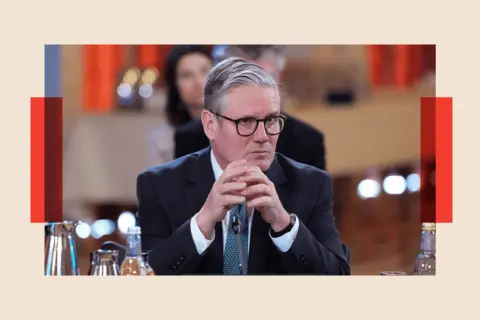 EPA-EFE/Shutterstock
EPA-EFE/ShutterstockThe Whitehall wiring will be redirected to try to make that happen with a new approach under a 'quad' – where employers, the Department for Work and Pensions, the job centres, skills bodies, and the Migration Advisory Committee, that sets the specific rules, all work together.
The idea, to wean the economy off relying on staff from overseas, by pushing employers to work much harder to find staff from here at home.
That's the theory. Here are the politics: for years, conventional thinking in both main parties was the immigration was broadly good because it helped the economy. Politicians and members of the public who raised concern about the pace and scale of workers coming were sometimes dismissed.
One Cabinet minister says last time Labour was in power, when "people raised concerns, it was too easy to say it's a race question – there's a good understanding now that good, decent people worry about immigration – it's about fairness".
When it emerged that 900,000 people came to the UK in 2023 the prime minister held an emergency press conference accusing the Tories of a failed "open border experiment"'.
A senior government source says now the previous government wasn't "bringing in 100,000 scientists to live in central London, it was bringing in people to fix problems of the economy everywhere, often in poor communities".
Ministers accept there might always be a need for overseas staff with specific expertise to come to the UK. But Sir Keir Starmer's allies say he's been making the case for years, since a speech to the CBI in 2022, warning employers they wouldn't be able to rely on cheap foreign labour on his watch.
Since then, partly down to the Conservatives' tightening up of visa rules before they left office, the numbers of people coming to the UK legally has dropped a lot and is expected to fall further this year. But the political prominence of the issue overall has gone the other way.
By some polling measures in spring this year immigration and small boats passed the NHS as the biggest worry for voters in 2025.
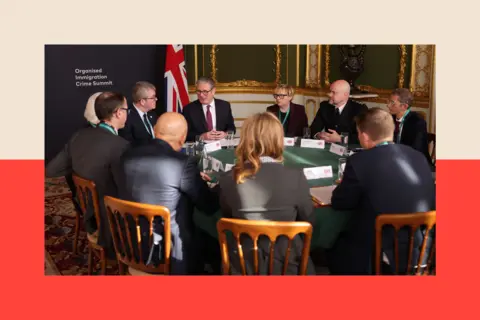
Sources inside government acknowledge that for many of the public, the issues of legal and illegal migration are bundled together.
While legal migration has been falling, the numbers of those coming in ways considered illegal and trying to claim asylum has gone the other way, hitting the highest level since 1979.
And there are two highly visible signs of that – small boat crossings, and asylum seekers being housed in hotels around the country.
One member of the government told me, "it's the boats, and everything is amplified on social media, we know it's having an effect as it's fed back to us on the doorstep – as a party we just seem to be floundering".
The use of hotels isn't just costly – projected recently to be £15bn, triple the amount the Conservatives reckoned when they signed the contracts back in 2019 – they can also create unease and resentment in communities.
A Labour MP with an asylum hotel in their constituency tells me a big part of the problem is that constituents link spending on hotels with the government squeezing cash elsewhere.
"It is impossible to make the case we need to do some form of austerity while we are spending so much money on putting people up here – whether it's winter fuel and PIP (welfare payments) – you haven't got money for this, but you have money for that."
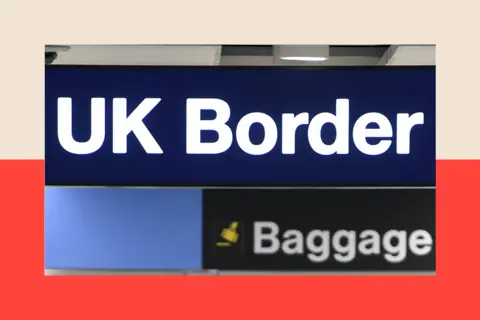 PA Media
PA MediaThere's even a belief in Downing Street that had there not been an asylum hotel in Runcorn, Labour would likely have held on to its seat in the by election last week.
The other blindingly obvious reason immigration has become so fraught politically is that for decades, successive governments have told the public one thing but done another. Under Tony Blair, people from countries joining the EU were allowed immediately to come and work in the UK.
The government had publicly estimated the numbers likely to move would be around 13,000, but hundreds of thousands of people from Eastern Europe made the UK their home in the following years. Papers released at the end of last year reveal that some of Blair's team worried precisely about that happening.
David Cameron then promised repeatedly that he'd get the number of extra people settling in the UK under 100,000. That vow was repeatedly broken. His government's lack of ability to control migration from Europe was at the core of the Brexit argument.
With deep irony, Boris Johnson won that argument in the referendum, then set up an immigration system that allowed even more people to move to the UK, peaking at 900,000 in 2023. Rishi Sunak then promised to "Stop the Boats" - but they still came.
A No 10 insider says the "public has been gaslit for years – taxpayers have been told it's happening, but nothing has been changing".
It's Cooper and Sir Keir who are now under huge pressure to get the numbers down and keep their vow to "smash the gangs".
The plans for managing legal migration better on Monday will be followed by a meeting in Albania later in the week, where the focus will be on cracking the illegal trade that smuggles people across Europe.
Ministers hope their plans will make a difference, although screeds of extra immigration law have not exactly improved the situation in recent years.
Making a complex system that doesn't work even more complicated will not necessarily be a success. But in government there's no doubt how vital it is– not just to fix a system that's been failing, but to demonstrate to voters that something is being done.
The plans we'll talk about in the next couple of days have been long in the making. But Reform's massive success at the ballot box shows why Labour has to get this right.
As one member of the government reckons, the public "got rid of the Tories by voting for us, there was no love for Labour, and they are prepared to do the same to us".

Sign up for the Off Air with Laura K newsletter to get Laura Kuenssberg's expert insight and insider stories every week, emailed directly to you.

BBC InDepth is the home on the website and app for the best analysis, with fresh perspectives that challenge assumptions and deep reporting on the biggest issues of the day. And we showcase thought-provoking content from across BBC Sounds and iPlayer too. You can send us your feedback on the InDepth section by clicking on the button below.
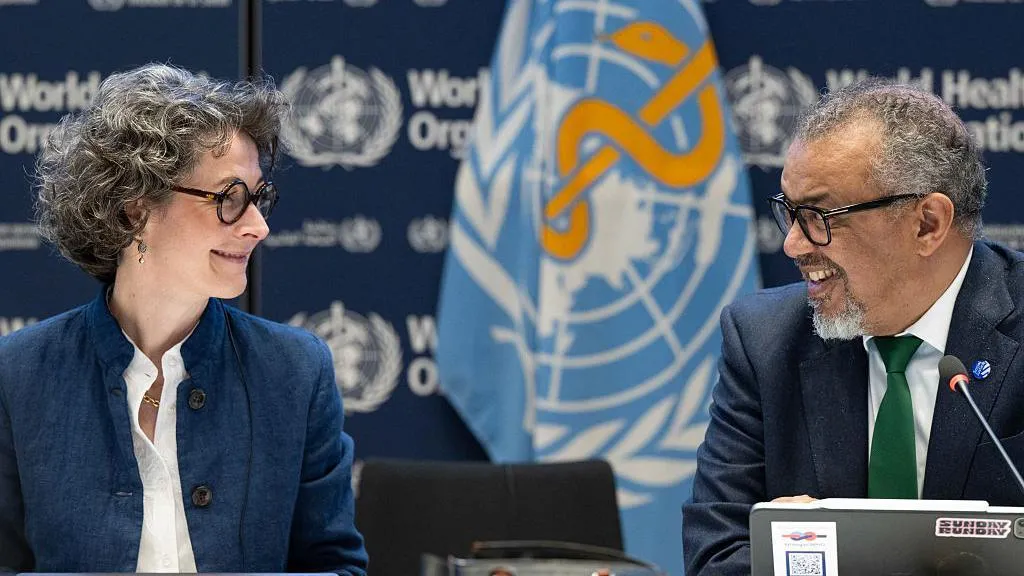
13 PerFlyer